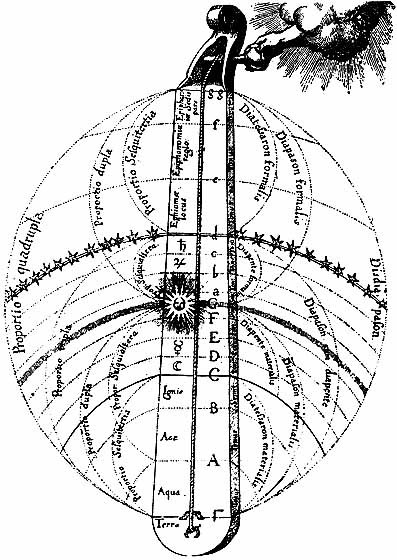I was not looking forward to this semester, but I think it's going to be ok.
This semester I am taking Music History 2313: Ancient to Baroque. This class is notorious for being insanely difficult and overwhelming. This may be true, but so far I have found it immensely interesting.
Today we talked about Pythagoras and Boethius, two philosophers who lived 800 years apart but addressed similar issues regarding music.
Pythagoras (inventor of the Pythagorium Theorem) was the creator of the monocord, the first instrument to demonstrate the octave, fifth, and fourth. As the legend goes, se discovered these intervals when he walked by a blacksmith's shop and heard the different pitches made by hammers and weights. He ran home, strung cords across a room, attached different weights to the cords, and when he hit the weights with hammers, heard various pitches. The heaviest weight (12 lbs) and the lightest weight (6 lbs) sounded an octave; the ratio was 2:1. The next weight, 8 lbs, when played with the heaviest weight, sounded a fourth--3:2. The 9 lb weight sounded a fifth, causing the ratio to be 4:3. Turns out that the myth is, in fact, only a myth. Different weights do sound different pitches, but do not display intervals. His ratios, however, ARE correct and were revolutionary in the progression and development of musical instruments.
Boethius wrote a treatise on the three kinds of music, or rather the three kinds of music in his opinion.
The first is music of the universe: musica mundana. This refers to not only the harmony and rhythm in which the universe and its contiuents ebb and flow, but also to the ACTUAL sound the universe makes! Recently it was discovered that the universe "hums" at 14 octaves below middle C! Isn't that fascinating?! Of course Boethius didn't know the exact pitch, but he at least theorized that it existed!
The second is the music of mankind: musica humana. The human body is very similar to a symphony in the way that all of the organs, blood, and organisms work together in (usually) flawless harmony to maintain an incredibly complex being.
The third, and interestingly least discussed by Boethius, is instrumental music: musica instrumentis constituta. One would expect him to discuss this category at length, but he doesn't. Although 1st century mankind had music, it was not shared by the common folk. In fact, music was grouped with arithmetic, geometry, and astronomy in the seven liberal arts (the other three, the trivium, being grammar, dialectic, and rhetoric).
I love Boethius's thoughts on the various kinds of music. I rarely, if ever, think of the universe and body as a collection of harmonious symphonies, but they are!
As the author writes,
Shout for joy, O heavens, for the Lord has done it!
Shout joyfully, you lower parts of the earth;
Break forth into a shout of joy, you mountains,
You forest, and every tree in it;
For the Lord has redeemed Jacob
And in Israel He shows forth His glory.
[Isaiah 44:23]
^ This is a combination drawing of Pythagorus's and Boethius's ideas, orchestrated by the hand of God.
I love studying music.
Subscribe to:
Comments (Atom)




